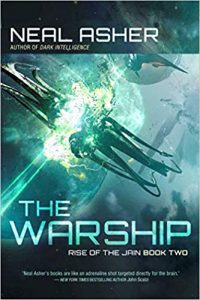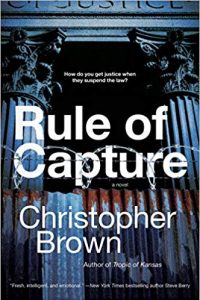Russell Letson Reviews The Warship by Neal Asher
 The Warship, Neal Asher (Night Shade 978-1-59780-990-0, $26.99, 369pp, hc) May 2019. Cover by Adam Burn.
The Warship, Neal Asher (Night Shade 978-1-59780-990-0, $26.99, 369pp, hc) May 2019. Cover by Adam Burn.
Okay, now it’s getting complicated. I called Infinity Engine (2017), the finale of Neal Asher’s Transformation trilogy, “sprawling and shaggy,” a description that applies as well to his new book. The Warship is the plot-thickening middle volume of a trilogy that is also part of the Polity future history series that so far consists of five sub-series spread across 16 novels and three short-form collections. I’m not sure what might constitute a spoiler in this situation, but there are certainly matters that a well-mannered reviewer ought not reveal (what warship? whose warship? that warship?) despite the deliberate tell provided by the series subtitle, Rise of the Jain.
Through much of the Polity series, the problem/plot-generator has been the near-magical, seductive, and deadly destructive “Jain technology,” which seems to be leftover but still operational weaponry from five-million-years-ago galactic wars that wiped out whole species and their civilizations. The first volume, The Soldier (2018), follows the resurrection and career of the eponymous creature, a resurrected Jain super-warrior; the struggle over a cache of Jain technology sequestered in a strange star’s accretion disk; and the involvement of a variety of interested parties (official and criminal) from the human Polity, the kingdom of the giant-crab Prador, and the very distant past. One might make a reasonable guess as to the nature of this volume’s title entity – but one also ought to be prepared to be misled, misdirected, and generally surprised by what pops out of the hat. Hint: it ain’t a bunny.
But then, it’s easy to be distracted from that central riddle when there are so many characters and stories swarming around the accretion disk and the nearby world of Jaskor, the headquarters of the force guarding the disk. The novel deploys a tangled plotline and a very large cast with complicated relationships rooted not only in the Polity series’ relatively recent back-story but in million-years-deep galactic history. Even with a two-page cast of characters, a three-page glossary of terms and reminders, and the now-familiar backgrounding chapter epigraphs, it’s all a dedicated reader can do to keep up with new and old dramatis personae and their intersecting story lines. Further complications arise from shifting alliances (and attendant betrayals), hidden agendas, and conspiracies and rivalries and feuds that might go back millions of years. In the furnace-like environment of this series, those are not bugs but features.
Cast members are subject to resurrection, rebirth, remaking, and reinvention – they change not only sides but physical bodies and entire mentalities. This transformation motif has been part of the series right along, a result of the power of ordinary human technologies (Orlandine, the extremely upgraded AI-human composite “haiman”), or the Spatterjay virus (the nearly indestructible human “hoopers” Cog and Trike; various Prador, including their king), or Jain technology (the android soldier Angel, formerly known as the enslaved, Jain-spreading Legate), or directed evolution, or combinations of these forces. Then there are the resurrectees and ancient-alien survivors of various kinds (the segmented-bodied Client; the moon-size Dragon) and a host of AIs and war drones that have been subverted or escaped their original functions and reasons-for-being – their design constraints – and gone rogue or mad or at least free-agent (the swarm AI called the Clade; the black-ops attack ship Obsidian Blade). Some of these are the creations or tools of others, some are responding to strange internal forces and logics, some are discovering what they are or were meant to be. It makes for a byzantine tangle of who’s doing what to whom and why, and even the “who” parts get confusing, given the possibility of subversion, mental enslavement, and radical transformation or awakening of the True Self or ancestral identity.
The foreground action emphasizes Action! on a grand scale, with combatants and scenery both taking beatings and legions of extras and walk-ons (humans, Prador, androids, drones, weapons platforms, AI warships) adding to the body count. Over the years I have returned to several comparisons when describing Asher’s work: Doc Smith (for space operatics), Olaf Stapledon (for vast galactic-historical sweep), Jacobean revenge tragedy (for grotesquery, melodrama, and gaudy violence), carnival thrill rides (for mere visceral excitement). All those apply here, and those titanic battle sequences suggest that I add the Marvel superhero franchise – thrill rides for the eyes – to the list. (Perhaps the recent-as-I-write-this opening of Avengers: Endgame and the four-walling of repeats of its stablemates on cable have highlighted that similarity.)
The book often seems dominated by SFX and explosions and high-speed hand-to-hand combat, and that’s all good fun, of a dire sort, but it’s also a lot smarter than those thrill-ride movies. A stronger draw on my attention, though, is the unfolding of the kind of world this is – a universe dominated by evolutionary and post-evolutionary forces that favor predation and conflict as their prime machineries. Underneath the surface of violent action and familiar Asherian grotesquerie, this series is drawing many of the elements of the Polity universe into a coherent narrative, accounting for the marvels and monsters in a single story. That could put a period to this line of the Polity’s history – but then, I thought that the Transformation trilogy might do that, and I was wrong.
Russell Letson, Contributing Editor, is a not-quite-retired freelance writer living in St. Cloud, Minnesota. He has been loitering around the SF world since childhood and been writing about it since his long-ago grad school days. In between, he published a good bit of business-technology and music journalism. He is still working on a book about Hawaiian slack key guitar.
This review and more like it in the June 2019 issue of Locus.
 While you are here, please take a moment to support Locus with a one-time or recurring donation. We rely on reader donations to keep the magazine and site going, and would like to keep the site paywall free, but WE NEED YOUR FINANCIAL SUPPORT to continue quality coverage of the science fiction and fantasy field.
While you are here, please take a moment to support Locus with a one-time or recurring donation. We rely on reader donations to keep the magazine and site going, and would like to keep the site paywall free, but WE NEED YOUR FINANCIAL SUPPORT to continue quality coverage of the science fiction and fantasy field.








Well thank you kindly!
Great review! I thought I was alone in sometimes struggling to remember who/what was what/who in the vast cast of people, things, AIs and the like: it’s difficult, after a hiatus spent reading Other SF, to get back in the picture quickly for one of Asher’s books, but…I manage, generally!
I have been reading him since I chanced upon Line of Polity a good few years back, in a Cape Town bookstore. I have snapped up every new offering since, lately as Kindle books (because print often doesn’t get here reliably) – and I have never been disappointed.
Bemused and confused from time to time, but never disappointed B-)